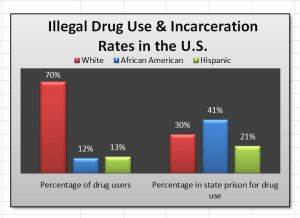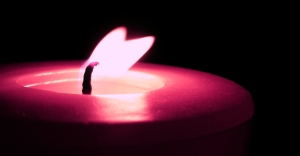I don’t want to lose you so I’ll start slow:
The Federal Government should legalize all illegal drugs.
Whoa- sorry. That just popped out. I was going to start with some statistics, walk you down the path that led me to make that very controversial statement. My bad.
Let’s start over.
You know, I think most people find the idea of doing meth distasteful. Same goes for heroin and crack cocaine. We shake our heads in dismay at the physical toll it takes on the body. We worry about our children and the choices they’ll make when they encounter illegal drugs.
I was first introduced to the concept of decriminalization1 in 2008 by a neighbor of mine in Colorado. He said the most shocking thing: “We should decriminalize all drugs.” And I freaked out. Freaked. Out. (Because: A. I’m a product of the D.A.R.E. generation; and B. At the time, I worked as a Corrections Officer at the county jail and a large number of inmates were obvious meth users and had sad, scary lives.)
My two main impressions about illegal drugs (and these are probably concerns shared by many other Americans) were these:
- Illegal drugs are worse for your health and more dangerous than legal drugs
- Illegal drug use is linked to higher rates of criminal violence
“What about heroin!? What about coke? And crack and meth!!! And…well, won’t it be dangerous for kids!?” I asked.
“Isn’t alcohol dangerous for kids? And cigarettes? And bleach? And riding in cars? And guns? And swimming? All of those things are legal.”
He was sort of flip and tended to disparage government services and regulation in general (he once told me we should eliminate speed limits and that driving drunk should be legal so long as you didn’t kill anyone), so I dropped the subject and wrote him off as one of those sovereign citizen types.
Health Concerns
But then I moved to Washington, and in 2012 it was one of two states to legalize recreational marijuana possession. I started doing some research about the actual safety and health concerns related to cannabis and came up with … nothing. Really. In the history of all recorded causes of death ever, not one single person has died of marijuana overdose2. Not one.
Additionally, there are no long-term health effects (other than lung-related ailments if one is a long-term smoker of weed, and alternative methods of consumption eliminate this health risk).
Even the DEA and CDC fact sheets on LSD, “magic mushrooms” and mescaline were surprisingly benign (the exact words were “Deaths exclusively from acute overdose of LSD magic mushrooms, and mescaline are extremely rare.”) Yes, heroin and meth are more dangerous, and the instances of overdose are more common.3 But did you know that in 2010 more people in the US died of prescription drug overdose (22,134) than all other illegal drugs combined (17,000)?4 And even that number is peanuts when you look at the number of deaths caused by alcohol in the US alone: 88,000. In the world: 2.5 million.
Globally, tobacco use causes more than 5 million deaths per year. In the US, more than 440,000 people die every year from cigarette smoking (including second-hand smoke related fatalities). Yet smoking and drinking are legal, regulated, and taxed. And we know from experience that alcohol prohibition didn’t stop people from drinking or curb the distribution of alcohol (rather, it made drinking more dangerous than it is now due to unsafe manufacturing processes and unregulated alcohol content, not to mention the illegal enterprises that sprouted up to make money on the black market).
It’s clear that the most common illegal drugs are hardly a public health risk when compared to legal substances, so what are some of the other arguments against legalizing or decriminalizing illegal drugs?
Crime and Criminals
Along with concerns about the health effects of illegal drugs, my other immediate reaction to the idea of decriminalization involved public safety and crime related to drug use, trafficking, and dealing. Weren’t people who used and dealt drugs also violent? That’s why they go to prison, right? Wrong.
According to the Bureau of Justice Statistics, only 3.9% of homicides are drug-related5.
“Contrary to conventional wisdom and popular myth, alcohol is more tightly linked with more violent crimes than crack, cocaine, heroin or any other illegal drug. In state prisons, 21 percent of inmates in prison for violent crimes were under the influence of alcohol–and no other substance–when they committed their crime; in contrast, at the time of their crimes, only three percent of violent offenders were under the influence of cocaine or crack alone, only one percent under the influence of heroin alone.” – Joseph Califano, Behind Bars: Substance Abuse and America’s Prison Population
In 2007, more than 14 million arrests were made in the US. Of those, drug abuse violations came in at #1 with over 1.8 million people arrested for possession, trafficking, manufacturing, and distribution of illegal substances. According to the same BJS report, more than 4/5 of those arrests were for possession. And while the number of arrests for sale or manufacture of drugs has stayed static at about 300,000 annually since the late 80s, the number of arrests for possession has tripled from around 500,000 per year to over 1.5 million arrests per year.
And when these people are arrested, they’re very often convicted and sent to prison. Federal mandatory minimums, truth in sentencing laws, and three-strikes laws have all played extensive roles in the prison population explosion in the last 20 years. Not only are people going to prison for non-violent crimes, they’re often going away for a very, very long time. Federal mandatory minimums outline the sentencing ranges for different amounts of illegal substances:
Pursuant to 21 U.S.C. §§ 841(b)(1)(A) and 960(b)(1), a statutory range of ten years to life applies to offenses involving at least:
1 kilogram of Heroin
5 kilograms of Cocaine (powder)
280 grams of Cocaine base
1,000 kilograms of Marijuana or 1,000 plants
50 grams of actual Methamphetamine or 500 grams of mixture or substance
Pursuant to 21 U.S.C. §§ 841(b)(1)(B) and 960(b)(2), a statutory range of 5 to 40 years applies to offenses involving at least:
100 grams of Heroin
500 grams of Cocaine (powder)
28 grams of Cocaine base
100 kilograms of Marijuana or 100 plants
5 grams of actual Methamphetamine or 50 grams of mixture or substance
Enhanced Penalties. Sections 841(b) and 960(b) include enhancement provisions based on the defendant’s prior record, which are only applicable if the government provides notice pursuant to 21 U.S.C. § 851 (Proceedings to establish previous convictions). A qualifying prior conviction increases a 5- to 40-year range to a range of 10 years to life. A qualifying prior conviction increases a 10-year mandatory minimum to a 20-year mandatory minimum (the maximum remains life); a second qualifying prior conviction increases a 10-year mandatory minimum to mandatory life.
That’s a lot of numbers so I’ll take a break for now. What I want to point out here is that millions of people (including a vastly disproportionate number of Black and Latino/a Americans) are going to prison and staying in prison for a long time simply for possessing and using substances that are comparable to legal drugs like alcohol, tobacco, and acetaminophen.
Why?
There are a number of reasons why the war on drugs is still a viable platform for our politicians – too many reasons to discuss in detail today – But we’ve looked at two of the most successfully propagated myths (public health and crime prevention) and in my next post I plan to address racial disparities in the criminal justice system as well as examine the financial motivations in the war on drugs (like private prisons and the liquor lobby).
The fundamental question is this: Do people who choose to use drugs deserve to go to prison for doing so? Really think about that. And if your answer is still “Yes,” ask yourself if people who drink alcohol deserve to go to prison, or if people who use prescription drugs should be locked up? After prohibition failed miserably in the US, the US Government adjusted its approach. Rather than make the alcohol illegal, it was regulated and taxed. And those activities that presented a true public health or safety risk were made illegal (driving while intoxicated, contributing to a minor, etc.) So now that I’ve thrown some statistics at you, I’ll reframe my original statement: The war on drugs isn’t slowing drug use or reducing violent crime. It’s time to decriminalize all illegal drug use and possession.
————–This is Part 1 of a two-part series————-
—————————————————————————————————————————————-
http://thinkprogress.org/justice/2013/01/18/1468591/police-made-more-arrests-for-marijuana-possession-than-for-violent-crime/
1The difference between “legal” and “decriminalized” varies by state. While Washington State has “legalized” possession of up to an ounce of cannabis, there are still a significant number of regulations restricting how it will be grown, processed, and sold. So, it’s legal in the state of Washington to carry and consume specified amounts of marijuana, but much like alcohol and tobacco there are laws to regulate the sale and manufacture of cannabis goods, as well as laws that detail enforcement and sentencing for selling to a minor, driving under the influence, and public consumption. “Decriminalization,” on the other hand, often simply involves a local or state convening authority declaring that certain activities will no longer be prosecutable offenses, or that those activities will now be considered misdemeanors or civil infractions punishable only by fines rather than felony offenses. In 2010, prior to I-502 (the initiative to legalize recreational marijuana in WA state) the Seattle City Council voted to reclassify possession of small amounts of marijuana as a civil infraction rather than a misdemeanor, and the Mayor instructed the police department to make arrests and searches for cannabis the department’s lowest priority. This was essentially decriminalization. There were no laws explicitly authorizing possession of cannabis, but sanctions for violations were much more lenient, if/when they were enforced at all.
If it seems that I’m using these terms interchangeably throughout this post, it’s because I am. Decriminalization is the more likely than legalization for the majority of presently illegal substances. I’ll take either one (or both).
2In contrast, according to propublica.org, over 1500 people died from acetaminophen poisoning between 2001 and 2010. That’s about 150 people per year.
346 people died of heroin overdoses in Minneapolis in 2011 – by comparison 204 people died in the same city during 2011 in motor vehicle accidents
417,000 deaths attributed to illegal drugs, including those deaths caused by vehicle accidents, HIV infections, and hepatitis
5 Victims of violent crimes who chose to participate in the BJS victim perception survey reported that just 4.9% of offenders were on drugs when they committed their violent crime. Alcohol, however, was reported by to be a factor in over 15% of violent crimes. 28.8% reported the perpetrator was not under the influence of drugs or alcohol and 44.2% reported they didn’t know.













